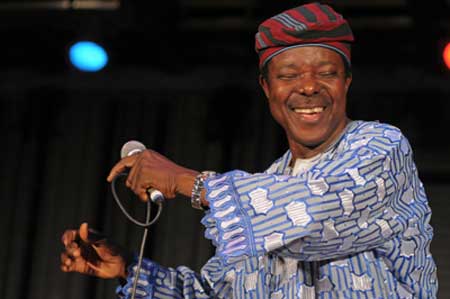
Sunny Adé was born Sunday Adeniyi, on September 22, 1946. He is a popular performer of Yoruba Nigerian jùjú music and a pioneer of modern world music. He has been classed as one of the most influential musicians of all time.
Adé was born to a Nigerian royal family in Ondo, thus making him an Omoba of the Yoruba people. His father was a church organist, while his mother was a trader. Adé left grammar school in Ondo under the pretense of going to the University of Lagos. There, in Lagos, his mercurial musical career started.
Sunny Adé’s musical sound has evolved from the early days. His career began with Moses Olaiya’s Federal Rhythm Dandies, a highlife band. He left to form a new band, The Green Spots, in 1967. Over the years, for various reasons ranging from changes in his music to business concerns, Sunny Adé’s band changed its name several times, first to African Beats and then to Golden Mercury.
In the 1970s and 1980s Adé embarked on a tour of America and Europe where he played to mixed (both black and white) audiences. His stage act was characterised by dexterous dancing steps and mastery of the guitar. Trey Anastasio, American guitarist, composer and one of his devout followers, once said, “If you come to see Sunny Adé live, you must be prepared to groove all night.”
After more than a decade of resounding success in Africa, Adé was received to great acclaim in Europe and North America in 1982. The global release of Juju Music and its accompanying tour was “almost unanimously embraced by critics (if not consumers) everywhere”. Adé was described by The New York Times’ as “one of the world’s great band leaders”, and in Trouser Press as “one of the most captivating and important musical artists anywhere in the world”.
His next album, Syncro System (1983), was equally successful and earned him his first Grammy Award nomination in the folk/ethnic music category.
At the beginning of another round of tour of the United States and Canada, in 2009 comeback, Sunny Adé, now known as The Chairman in his home country, was appointed a visiting professor of music at the Obafemi Awolowo University Ile-Ife. In July the same year King Sunny Adé was inducted into the Afropop Hall of Fame, at the Brooklyn African Festival in the United States. He dedicated the award to the late king of Pop,Michael Jackson.
Sunny Adé’s music is characterised by, among other instruments, the talking drum, an instrument indigenous to his Yoruba roots, the guitar and his peculiar application to jùjú music, that would easily put him in the same class as guitar musicians like Santana. His music is in the age-old tradition of singing poetic lyrics (“ewi” in Yoruba) and praise of dignitaries as well components of Juju (traditional African belief) called the Ogede (casting a spell). Hence, Adé’s music constitutes a record of the oral tradition of his people for posterity.
Sunny Adé was the first to introduce the pedal steel guitar to Nigerian pop music. He was the first to introduce the use of synthesizers, clavinet, vibraphone, tenor guitar into the jùjú music repertoire such as dub and wah-wah guitar licks.




















